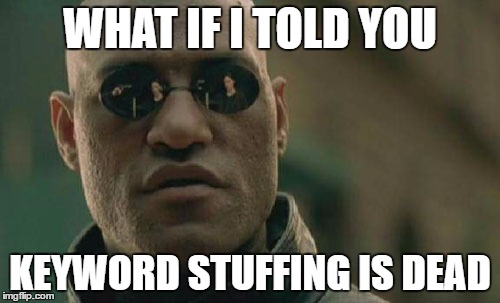10 Common SEO Myths You Should Ignore In 2023
- Dheeraj Soni
- 10 mins read
SEO, or search engine optimization, is the process of improving the ranking of a website on search engines like Google in order to increase the visibility and traffic to the website. It involves optimizing various elements of a website, including its content, structure, and technical aspects, in order to make it more attractive to search engines and improve its ranking in search results.
Over the years, various myths and misconceptions have emerged about SEO, and it is important to debunk these myths in order to have a better understanding of how SEO works and how to effectively optimize a website.
Table of Contents
Myth 1: Keyword stuffing is an effective SEO technique.

One common myth about SEO is that including a large number of keywords in the content of a website will improve its ranking on search engines. This practice, known as keyword stuffing, used to be effective in the early days of the internet, but search engines have become much more sophisticated in recent years and can easily detect keyword stuffing. In fact, keyword stuffing can actually harm the ranking of a website, as search engines may view it as spammy and low-quality.
Myth 2: SEO is all about keywords.
While keywords are an important aspect of SEO, they are just one part of a much larger picture. In addition to using relevant keywords, it is also important to have high-quality, informative, and engaging content that provides value to the reader. Other factors that search engines consider when ranking websites include the structure and organization of the content, the user experience, the website’s technical aspects, and the overall credibility and authority of the website.
Also Read – A to Z Keyword Research Guide
Myth 3: SEO is a one-time process.
Another myth about SEO is that it is a one-time process that can be completed and then forgotten about. In reality, SEO is an ongoing process that requires constant monitoring and optimization in order to maintain and improve the ranking of a website. Search engines constantly update their algorithms, and it is important to stay up-to-date with these changes and adjust the SEO strategy accordingly. Additionally, the content on a website should be regularly updated in order to keep it fresh and relevant for both search engines and users.
Myth 4: It is easy to manipulate search engine rankings.
Some people may believe that it is easy to manipulate search engine rankings through tactics like buying links or using hidden text. However, search engines have become very sophisticated at detecting these types of tactics and can penalize websites that use them. The best way to improve the ranking of a website is to focus on creating high-quality, relevant content and following best practices for SEO.
Myth 5: SEO is only for large businesses.
Another myth about SEO is that it is only relevant for large businesses with a significant budget to invest in it. While it is true that larger businesses may have more resources to devote to SEO, the benefits of SEO can be realized by businesses of all sizes. In fact, small businesses can often benefit more from SEO, as they may have a more limited budget for other forms of marketing and can use SEO to reach a larger audience and attract new customers.
Myth 6: SEO is not important for small niches.
Some people may believe that SEO is only relevant for large, competitive industries, and that it is not necessary for small niches with fewer competitors. However, SEO can be just as important for small niches, as it can help to increase the visibility and credibility of a website and attract a targeted audience.
Myth 7: SEO is not necessary if you have a strong social media presence.
While social media can be a powerful marketing tool, it should not be seen as a replacement for SEO. While social media can help to drive traffic to a website, it is only one aspect of a comprehensive digital marketing strategy. Search engines like Google are still the primary way that most people find information and websites online, and optimizing a website for search engines can help to increase its visibility and reach a wider audience. In addition, having a strong presence on both search engines and social media can help to improve the overall online presence and credibility of a business.
Myth 8: SEO is too expensive.

Some businesses may be hesitant to invest in SEO due to the perceived cost. While it is true that SEO can require a significant investment of time and resources, the long-term benefits can far outweigh the initial cost. Investing in SEO can help to drive targeted traffic to a website, increase sales and conversions, and improve the overall online presence of a business. In addition, there are a variety of SEO strategies that can be implemented at different budget levels, so it is important to find a strategy that works for a business’s specific needs and resources.
Myth 9: Meta tags and titles are not important for SEO.
Meta tags and titles are important elements of a website that provide information to search engines about the content of the page. While they may not carry as much weight as they did in the past, they are still an important aspect of SEO and should be carefully optimized in order to improve the ranking of a website.
Myth 10: Link building is no longer important for SEO.
Link building, or the process of acquiring links from other websites to your own, used to be a key aspect of SEO. While the importance of link building has decreased in recent years, it is still a factor that search engines consider when ranking websites. However, it is important to focus on building high-quality, natural links rather than trying to manipulate search engine rankings through unethical link building practices.
Conclusion
SEO is an important aspect of digital marketing that can help to increase the visibility and credibility of a website and drive targeted traffic to it. While there are many myths and misconceptions about SEO, it is important to understand the reality of how SEO works in order to effectively optimize a website and improve its ranking on search engines.
Advance Learning
Occasional emails that will help you deliver value via SEO.
